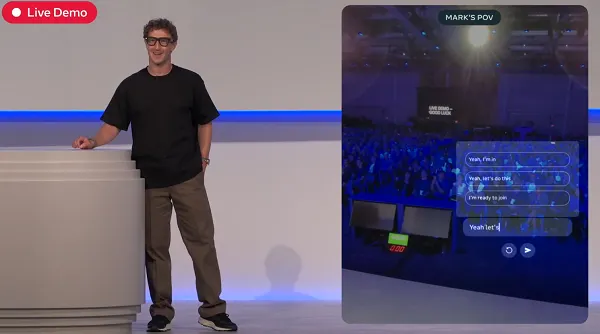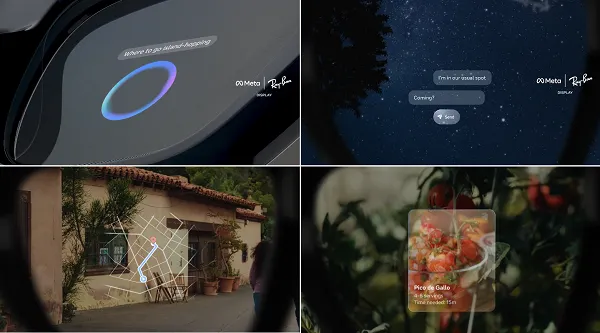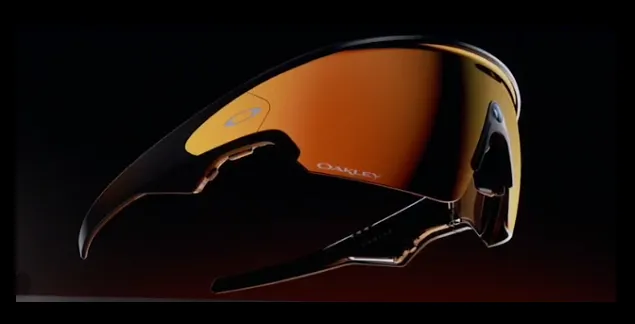Meta has launched its two-day Meta Connect conference, where CEO Mark Zuckerberg showcased a range of its next-level projects, including new AI glasses models, improvements to VR creation, next-level digital interaction tools, and more.
The star of Meta Connect 2025 is Meta’s new Ray-Ban-branded Display AI glasses, which include a heads-up display element to overlay info on the wearer’s view.
As you can see in this example, Meta’s Display glasses will enable the user to engage with a digital interface, via a small screen overlaid inside the lens, which the wearer will control via Meta’s revolutionary wristband device.
Meta’s “neural wristband”, which Zuckerberg described as “the next chapter in the exciting story of the history of computing,” uses differential electromyography (EMG) to detect muscle movement, which it can then translate into digital signals. The end result is a whole new way of interacting with the digital environment, which Meta’s hoping will become the foundation for its future AR and VR projects.
As per Meta:
“We’re really excited to introduce our Meta Neural Band. It replaces the touchscreens, buttons, and dials of today’s technology with a sensor on your wrist, so you can silently scroll, click, and, in the near future, even write out messages using subtle finger movements.”
Zuckerberg showcased several uses for the device, including the ability to quickly message or call somebody with subtle gestures, or translate your handwriting to text on screen, by miming the physical action of writing.

I mean, it does look a little bit like you’re fidgety, with the wearer touching their thumb and finger together over and over at their side to control most of these options. But it is a fairly subtle option for digital control.
The neural wristband has 18 hours of battery life, and is water-resistant.
The commercial launch of the wrist controller, which Meta has been developing for years, is a critical element of Mark Zuckerberg’s grand vision to eventually have glasses take over as the key connective device, superseding phones as our mobile link to the online world.
Control is the key hurdle in this push, and it’ll require a significant habitual shift to get people away from swipes and taps, and moving towards more intuitive, less overt, controls.
And while Meta’s not kicking this off with its fully enabled AR glasses (which remain on schedule for launch next year), the capacity to engage in any way via the wrist controller is a key entry point for the tech. But it will take time to gain traction, which could be why Meta’s chosen to start off smaller than full AR here, with basic functions and controls that will help in everyday life, like engaging with messages, getting information about what you can see, etc.

This is the key announcement of Connect, the central focus for Meta’s next-level push. And while there’s a lot to come on this front, this is a huge moment for the company, and potentially, for digital interactivity in general.
Meta’s Display AI glasses will be priced at $799, and are launching on September 30th.
Meta also announced a new AI glasses model specifically designed for athletes, with its Oakley Meta “Vanguard” glasses designed to minimize weight, and track key health and performance data.

As you can (kind of) see in this image, the Vanguard AI glasses have the camera in the middle of the frame, which ensures better weight distribution, and less weight overall because there’s only one camera.
The Vanguard glasses will also have a wider field of view (120 degrees), as well as improved video stabilization for active use.
Meta’s also adding slow motion and Hyperlapse camera modes (available in all Meta glasses models), while it’s also partnering with Garmin and Strava to synch relevant performance data with the device.
The Vanguard glasses will be selling for $499, with pre-orders available now shipping in October
Meta also announced updates to its current Meta’s Ray Ban AI glasses, including improved battery life, 3K video recording, improved live translation, and “Conversation Focus”, which can amplify your friends’ voices in your ear.

Meta’s Live AI is also getting an upgrade, which will enable the system to provide more active assistance for informational tasks based on what you can see.
These are all key projects, with the Neural Band being the real key, and Zuckerberg’s hoping that they’ll drive more adoption of Meta’s AI glasses models.
Zuckerberg noted that the sales trajectory of its AI glasses thus far is “similar to some of the most popular consumer electronics products of all time,” and the opportunity to regain a sense of presence in the moment, which we’ve lost with phones, is a major benefit.
So while these may not feel revolutionary, as such, these are all key developments, leading into the next stage of Meta’s wearables push.
On the VR front, Zuckerberg discussed the evolution of VR creation, with AI now enabling people to generate full VR experiences by simply speaking them into existence.
Meta’s been developing this technology for some time, with evolving additions to its Horizon Worlds creator platform providing more ways to build your own VR environment through text-prompts.
And now, Meta’s looking to build on this, with Horizon Studio, powered by its new Meta Horizon engine, which will replace Unity as Meta’s VR operating system.

As you can see in this example, Horizon Studio will facilitate simplified VR creation, with improved text prompts delivering more accurate creative responses.
Meta’s also adding an always on agentic AI assistant to speed up creation process, while Zuckerberg also previewed its new “Hyperscape” capture, which will be able to scan a room via a Quest headset, and convert it into an immersive 3D world.
Zuckerberg says that these technologies are “foundational infrastructure for the metaverse,” facilitating he democratization of VR creation, which has long been a significant barrier to entry.
Zuckerberg says that its improved VR OS will also have 4x faster load times, another step towards improving the VR experience.
Zuckerberg also previewed some coming VR games, as well as “Horizon TV,” which will incorporate video content from a range of providers in an upgraded, custom VR viewing experience.
These are some interesting developments, which point to the future of Meta’s next-level, metaverse-aligned push.
And while some people thought that Meta had moved away from the metaverse, Zuckerberg was very clear that the longer-term aims remains improved digital interaction via its interconnected metaverse experience.
AI will be foundational to this, but wrist control, and AR glasses, will also play a big role in maximizing take-up, leading into its more immersive VR environments.
It’s all connected, and Zuckerberg has shed new light on how the company is placed.



